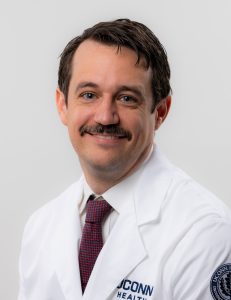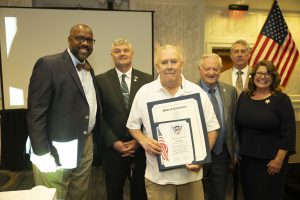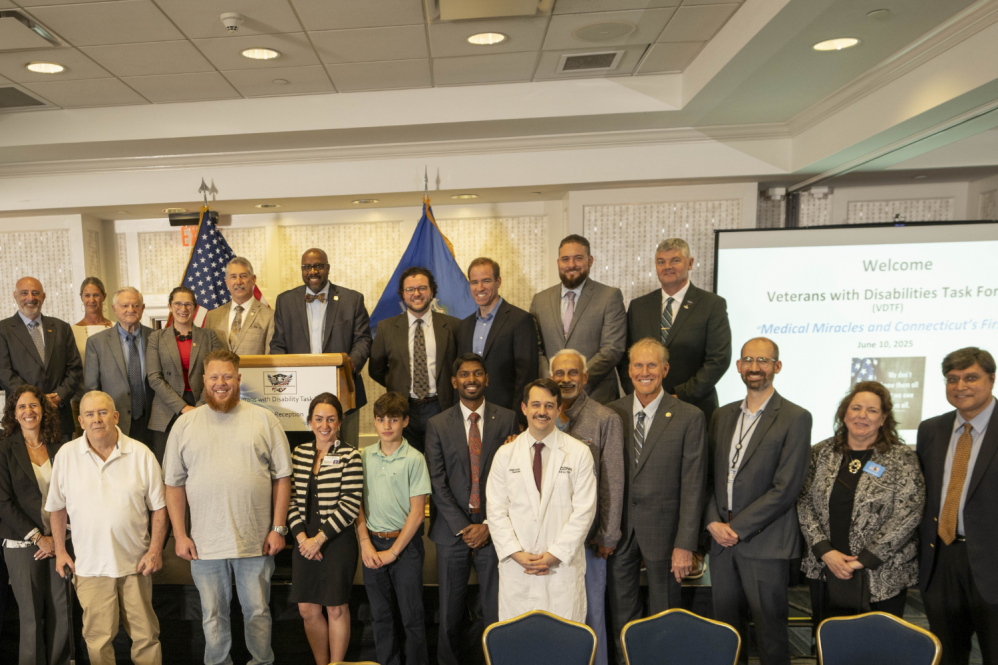UConn Health announced Connecticut created legislation to establish a Neuromodulation Center of Excellence at the Brain and Spine Institute that provides veterans access for stroke recovery through Vivistem, a product of Microtransponder. Vivistim is a transformative stroke intervention that helps ischemic stroke survivors improve upper limb function during the chronic phase of recovery when progress in therapy often slows.
According to the Centers for Disease Control and Prevention, stroke is a leading cause of serious long-term disability. Addressing this public health concern, Connecticut Rep. Henry Genga proposed legislation for the Neuromodulation Center of Excellence with support from the Veterans with Disabilities Task Force. The program is a collaboration between UConn Health and Hartford HealthCare.
UConn Health has been at the forefront of transforming the stroke continuum of care, having implanted Connecticut’s first 13 recipients of the Vivistim Paired VNS System. After implant, stroke survivors commence the six-week Vivistim protocol, which typically includes 18 90-minute occupational or physical therapy sessions where therapists use a wireless remote to communicate with the device, pairing vagus nerve stimulation with therapy tasks designed around the stroke survivors’ functional goals.

“Since launching the Vivistim program a year ago, we have seen incredible results with our stroke survivors that complement the clinical evidence supporting the safety and effectiveness of Vivistim,” said Dr. Chris Conner, director of functional and epilepsy neurosurgery at UConn Health. “We are receiving tremendous interest nationally and internationally from stroke survivors who are willing to travel for Vivistim Therapy, in addition to an increase in the number healthcare providers planning to launch Vivistim programs. We take pride that UConn Health is a leader of innovation, transforming the stroke continuum of care to ensure veterans and stroke survivors can achieve meaningful outcomes.”
“A remarkable first for the state of Connecticut, the Neuromodulation Center of Excellence sets the standard for how our country can ensure veterans are among the first to access groundbreaking medical technology that offers life-changing care,” said Rep. Genga, who serves as Connecticut’s House Majority Whip at Large. “It has been my honor to champion this bill because of the strong clinical evidence that demonstrates Vivistim helps stroke survivors thrive through disability with improved upper limb function, more independence and restored dignity.”
Vivistim is the first and only intervention clinically proven to help chronic ischemic stroke survivors regain 2-3 times more upper extremity function than high-intensity stroke therapy alone. In current clinical practice, the Vivistim device is implanted in stroke survivors, enabling therapists to use a wireless remote that communicates with the device to pair vagus nerve stimulation with high-repetition, goal-oriented functional activities to increase neuroplasticity. The standard protocol is for stroke survivors to participate in in-clinic Vivistim Therapy during 90-minute sessions three times a week for six weeks.
Validating the long-term effectiveness of Vivistim Therapy™, a one-year follow-up analysis study published in the May 2025 issue of Stroke demonstrated that stroke survivors treated with Paired VNS™ Therapy for upper extremity deficits post-stroke maintained improvements in function, activity, participation and quality of life for at least one year after completing the course of therapy and utilizing self-directed therapy outside of the clinic.
“MicroTransponder applauds Rep. Genga, UConn Health, Hartford HealthCare, the Veterans with Disabilities Task Force and all of the supporters for this first-of-its-kind legislation that validates Vivistim as therapy for life for helping stroke survivors recover from upper extremity paralysis,” said Richard Foust, MicroTransponder’s CEO. “The Neuromodulation Center of Excellence is a replicable solution to address veterans’ unique public health concerns and the limited treatment options that previously existed for stroke survivors beyond acute intervention.”

For John Nute, who survived a stroke in 2013 and was the first Vivistim user in Connecticut in May 2024 when his surgery was performed by Conner, his therapy focused on his love for cooking. His range of motion increased significantly with Vivistim Therapy, enabling him to accomplish more in the kitchen, such as cutting a cucumber.
The Neuromodulation Center of Excellence will launch in 2027 with 10 patients who will be implanted at UConn Health’s Brain and Spine Institute. Hartford HealthCare will conduct their therapy. The collaboration was fostered by the Veterans with Disabilities Task Force, which was created to reduce veteran suicides by closing access gaps to social services and advanced medical care.
Stroke survivors, caregivers and healthcare professionals interested in discovering how Vivistim Paired VNS Therapy helps improve upper limb function can visit Vivistim.com or contact the Neurosurgery Department at UConn Health’s Brain and Spine Institute.



